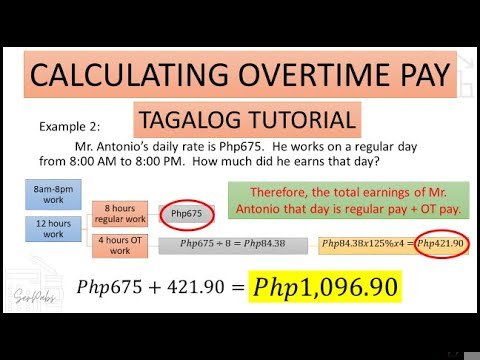Alam mo ba kung paano i-compute ang overtime pay Philippines? Ang tamang paraan ay umaasa sa labor code at mga patakaran ng Department of Labor and Employment (DOLE). Sa artikulong ito, tutuklasin natin ang mga hakbang kung paano i-calculate nang eksakto ang overtime pay, upang masigurong makakatanggap ka ng nararapat na benepisyo. Sundan lamang ang simpleng gabay na ito para maging aware sa iyong karapatan bilang empleyado.
How to Compute Overtime Pay in the Philippines: Your Easy Guide
Welcome! If you’re working in the Philippines or managing employees, you might wonder, “How do I know how much to pay for overtime?” Don’t worry! Computing overtime pay might sound tricky at first, but it’s easier once you understand the basic rules. In this article, we’ll walk through everything you need to know about how to compute overtime pay in the Philippines. Let’s make it simple and clear so you can feel confident about paying your employees correctly!
What Is Overtime Pay?
Overtime pay is extra money you give to employees when they work beyond their regular working hours. In the Philippines, the law says that if an employee works more than 8 hours a day, they deserve additional pay called overtime pay. This extra pay shows appreciation and encourages workers to put in extra effort when needed.
Why Is Overtime Pay Important?
- It protects workers’ rights and ensures they get fair compensation.
- It helps employers avoid legal problems and penalties.
- It motivates employees to work harder and stay happy at work.
Basic Rules for Overtime Pay in the Philippines
Who Are Covered?
Most employees in the Philippines are entitled to overtime pay, especially if they work more than 8 hours a day. This includes full-time workers, part-time workers, and even those in certain industries like retail, service, or manufacturing.
When Does Overtime Pay Start?
Overtime pay kicks in when an employee works beyond their regular 8 hours in a day. For example, if someone finishes their work at 5 PM but stays until 6 PM or 7 PM, they should be paid for that extra hour or hours.
Hours That Count
Only the hours worked beyond the scheduled 8 hours count for overtime pay. Work done during regular hours does not be paid as overtime.
How to Calculate Overtime Pay in the Philippines
Now the main part: how do you actually calculate the overtime pay? The process involves a few steps, but once you learn the formula, it becomes straightforward.
Step 1: Find the Daily Rate
The first step is to know how much your employee earns in a day. Here’s the simple formula:
Daily Rate = Monthly Salary / 22 days
Note: The law usually considers 22 working days in a month, not including rest days and holidays.
Step 2: Calculate the Hourly Rate
Next, find out how much your employee earns per hour. Use the formula:
Hourly Rate = Daily Rate / 8 hours
Remember, a standard workday is 8 hours.
Step 3: Determine the Overtime Rate
In the Philippines, overtime pay is at 125% of the regular hourly rate. That’s 1.25 times the ordinary hourly rate. So:
Overtime Rate = Hourly Rate × 1.25
This rate applies to each hour of overtime work.
Step 4: Calculate Total Overtime Pay
Finally, multiply the overtime rate by the number of overtime hours worked:
Overtime Pay = Overtime Rate × Number of Overtime Hours
Example: How to Compute Overtime Pay
Meet Ana, a factory worker earning PHP 15,000 per month.
- Monthly Salary: PHP 15,000
Step 1: Find Daily Rate
Daily Rate = PHP 15,000 / 22 = PHP 681.82
Step 2: Find Hourly Rate
Hourly Rate = PHP 681.82 / 8 = PHP 85.23
Step 3: Find Overtime Rate
Overtime Rate = PHP 85.23 × 1.25 = PHP 106.52
Step 4: Calculate Overtime Pay
If Ana worked 3 hours of overtime, her pay will be:
Overtime Pay = PHP 106.52 × 3 = PHP 319.56
So, Ana should receive PHP 319.56 extra for her 3 hours of overtime work.
Other Important Tips for Overtime Pay Calculation
Different Overtime Rates for Different Shifts
If your employee works night shifts or special hours, the rates might change. Be sure to check if there are specific rules for your industry or work type.
Rest Days and Special Non-Working Days
If your employee works on a rest day or a holiday, the overtime pay might be at a higher rate, like 130% or 150%. Always review the latest labor laws for these cases.
Handling Multiple Overtime Hours
If your worker does more than one overtime shift, just apply the same calculation for each period. Add up all the overtime pay to find the total.
Important Reminders When Computing Overtime Pay
- Always use the correct monthly salary for accurate calculations.
- Remember the 22 days per month rule to find the daily rate.
- Use active voice and clear steps to make calculation easy.
- Check the latest laws or company policies for any special rules or updates.
Learning how to compute overtime pay in the Philippines is simple once you understand the basic steps. Just remember: find the daily rate, then the hourly rate, then apply the 125% factor, and multiply by the overtime hours. This way, you’ll always pay your workers fairly and stay compliant with Philippine labor laws.
If you have more questions or need help with your specific case, don’t hesitate to ask a professional or refer to the Department of Labor and Employment (DOLE) guidelines. Happy calculating!
PH Labor Law – How to Compute Overtime Pay (Ordinary Working Day)
Frequently Asked Questions
Paano kalkulahin ang bayad sa overtime sa Pilipinas?
Para makalkula ang overtime pay, unang i-multiply ang regular hourly rate ng 1.25 o 125% kung regular day, o 1.30 o 130% kung special non-working holiday, at 1.30 o 130% kung regular holiday. Pagkatapos, i-multiply ang bagong rate sa bilang ng oras na inatusan mong mag-overtime. Halimbawa, kung ang araw ay regular working day, ang overtime rate ay 125% ng regular hourly rate.
Anong mga factors ang kailangang isaalang-alang sa pagkalkula?
Isaalang-alang ang uri ng araw kung saan ginawa ang overtime (regular day, special non-working holiday, o regular holiday), ang regular hourly rate ng empleyado, at ang bilang ng overtime hours na nagawa. Mahalaga rin na sundin ang mga regulasyon ng Labor Code ng Pilipinas ukol sa minimum overtime pay.
Paano kung nag-overtime sa weekend o holiday?
Sa mga araw ng holiday o weekend, ang overtime pay ay karaniwang mas mataas. Kung ito ay special non-working holiday, ang overtime ay binabayaran ng 130% ng regular hourly rate. Sa regular holiday, maaari ding mag-apply ang mas mataas na rate depende sa kumpanya at kasunduan, ngunit karaniwan ay 130% din ito.
Paano kung nagtatrabaho ng higit sa isang oras ng overtime?
Para sa bawat oras na nag-overtime, kailangang i-multiply ang regular hourly rate sa tamang multiplier depende sa uri ng araw. Para makuha ang kabuuang overtime pay, i-multiply ang overtime rate sa bilang ng overtime hours. Siguraduhing nakasunod sa batas sa pagtanggap ng bayad para sa bawat oras na nag-overtime ang empleyado.
Final Thoughts
Understanding how to compute overtime pay Philippines is essential for both employees and employers. To do so, determine the regular rate based on the daily wage, then multiply it by 1.25 for regular overtime, or 1.30 if during rest days or holidays. Multiply the adjusted rate by the number of overtime hours worked. Always ensure compliance with the Labor Code to avoid disputes. Knowing how to compute overtime pay Philippines helps ensure fair compensation and legal adherence in the workplace.
















